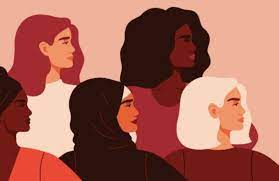Fielding female candidates in Kashmir is not a bad idea
Street Talk
Expert Opinion

Let me begin with a quote of Rabindranath Tagore: “Woman is the builder and moulder of a nation’s destiny, though delicate and soft as lily, she has a heart, stronger and bolder than that of a men, she is supreme inspiration for man’s onward march.”
I selectively picked his quote about women empowerment as the International Women’s Day falls on March 8, 2024, and this year the day is celebrated under the theme ‘Invest in women: Accelerate progress’. Frankly speaking, investing in women is on top of the list of wisest investment decisions for achieving the goal of peace, prosperity and profits for all generations to come. Therefore investing in women means empowering them.
Today there is global emphasis on women empowerment as the world leadership dominated by men has found themselves surrounded by many crises, ranging from geopolitical conflicts to soaring poverty levels and the rapidly increasing impacts of climate change. It is fervently believed that the solution to these crises lies in the investment in women. Precisely, investing in women turbocharges a future where everyone in a society/community can thrive, creating boundless opportunities and empowerment for all.
When we talk of empowering women, it doesn’t mean it is confined to a particular sector. The empowerment has to be broad-based. Even as economic empowerment most of the time dominates the debates around women empowerment, I think it’s the political empowerment of women which can go a long way to help societies/communities to grow in a most sustainable manner.
In other words, a considerable presence of women in politics and making it to parliament generally contributes to stronger attention to women’s issues. As observed in various studies on women empowerment, women’s political participation is a fundamental prerequisite for gender equality and genuine democracy. It facilitates women’s direct engagement in public decision-making and is a means of ensuring better accountability to women.
Since we are very close to parliamentary elections in the country and leadership of various political parties is working overtime to pick the best of the lot to contest the elections, the number of women contestants would be interesting to watch. It would be a tightrope walk as all eyes will be on whether the parties make a conscious decision to field more women in the upcoming election season. Remarkably, for the BJP that earmarks 33% of all posts in the party for women has been gradually increasing the number of women candidates in elections. The party has been encouraging and grooming women leaders. The number of women MPs, legislators and ministers has been on the rise.
In the context of Jammu & Kashmir, fielding women candidates especially in the ensuing parliamentary elections would be a shot in the arm of efforts to strengthen national integration of the region after pulling it out of the terror eco-system.
Historical Perspective
A peep into the background about J&K women in politics merits a mention in the backdrop of the increasing importance of women in politics in the current political set-up. As in other states of India, the women in Jammu and Kashmir remained lower in position and problems continued to engulf them on all counts. The facts documented by experts reveal that the state subjects in J&K were first time enfranchised in 1934, but on a very limited scale. For women folk, the right to vote was limited to pass-outs of the middle standards or an equivalent examination. The Franchise commission while giving out its reason for limited voting rights of the women folk had stated; ”The inclusion of women voters would increase the administrative difficulties of the election”. However, over a period of time, it was in 1951 when the state elections to the constituent Assembly were based on universal Franchise. Precisely, with the passage of time, the right of women to elect and to be elected in all institutions on the basis of equality with men and also the grant of equal rights to women in all the fields of national life including that service in the state became a reality.
Current Demand
In the dynamic landscape of Indian politics, the Bharatiya Janata Party (BJP) has consistently championed the cause of women’s empowerment. However, when it comes to the Kashmir region, there’s a unique opportunity for the party to not only uphold its commitment to gender equality but also to strategically advance its political agenda. As the upcoming parliamentary elections loom, it’s important for the BJP to field female candidates in Kashmir for the upcoming parliamentary elections.
As we all know that Kashmir has long been marred by political turmoil and strife. In such an environment, the voice of women often gets marginalized. By fielding female candidates, the BJP can provide a credible platform for Kashmiri women who approximately represent an equal percentage to men, to actively participate in the political process and have their concerns addressed at the highest levels of governance.
The inclusion of female candidates from the BJP in Kashmir will send a powerful message of progress and inclusivity. It will also challenge the traditional norms and stereotypes- a departure from the status quo. This symbolic gesture can inspire hope and encourage more women to engage in politics, which will establish a culture of democracy and pluralism in the region.
Kashmir, like many other regions in India, grapples with various gender-based challenges, including lack of access to education, healthcare, and economic opportunities for women. Female politicians, with their unique perspective and lived experiences, are better equipped to understand and address these issues effectively. By electing BJP female candidates, Kashmiris can ensure that their concerns are prioritized and addressed comprehensively.
The BJP’s decision to field female candidates in Kashmir will help in building trust and bridging divides within the community. Women often serve as the backbone of families and communities, and their representation in politics can create greater understanding and cooperation across different segments of society. It would be a step towards building a more cohesive and harmonious Kashmir.
From a strategic standpoint, the inclusion of female candidates can elevate the BJP’s electoral prospects in Kashmir. It will broaden the party’s appeal beyond traditional voter bases and demonstrate its commitment to diversity and inclusivity. Moreover, it will allow the party to present itself as a progressive force for change that in turn will attract support from a wider spectrum of voters.
If political experts are to be believed, the decision to field female candidates in Kashmir is not just a matter of political expediency; it’s a moral imperative and a strategic necessity. By empowering women and amplifying their voices, the BJP can not only contribute to the development and stability of Kashmir but also reaffirm its commitment to the principles of democracy, equality, and progress. On International Women’s Day, giving wings to the women of the region in a strong political arena would further pave the way for a brighter, more inclusive future for Kashmir and its people.
(The author is a veteran journalist/columnist & can be reached at [email protected])


